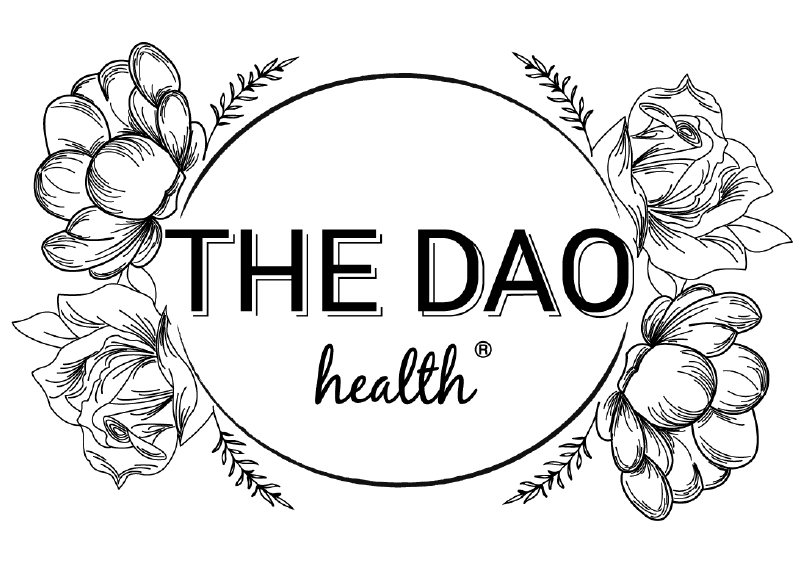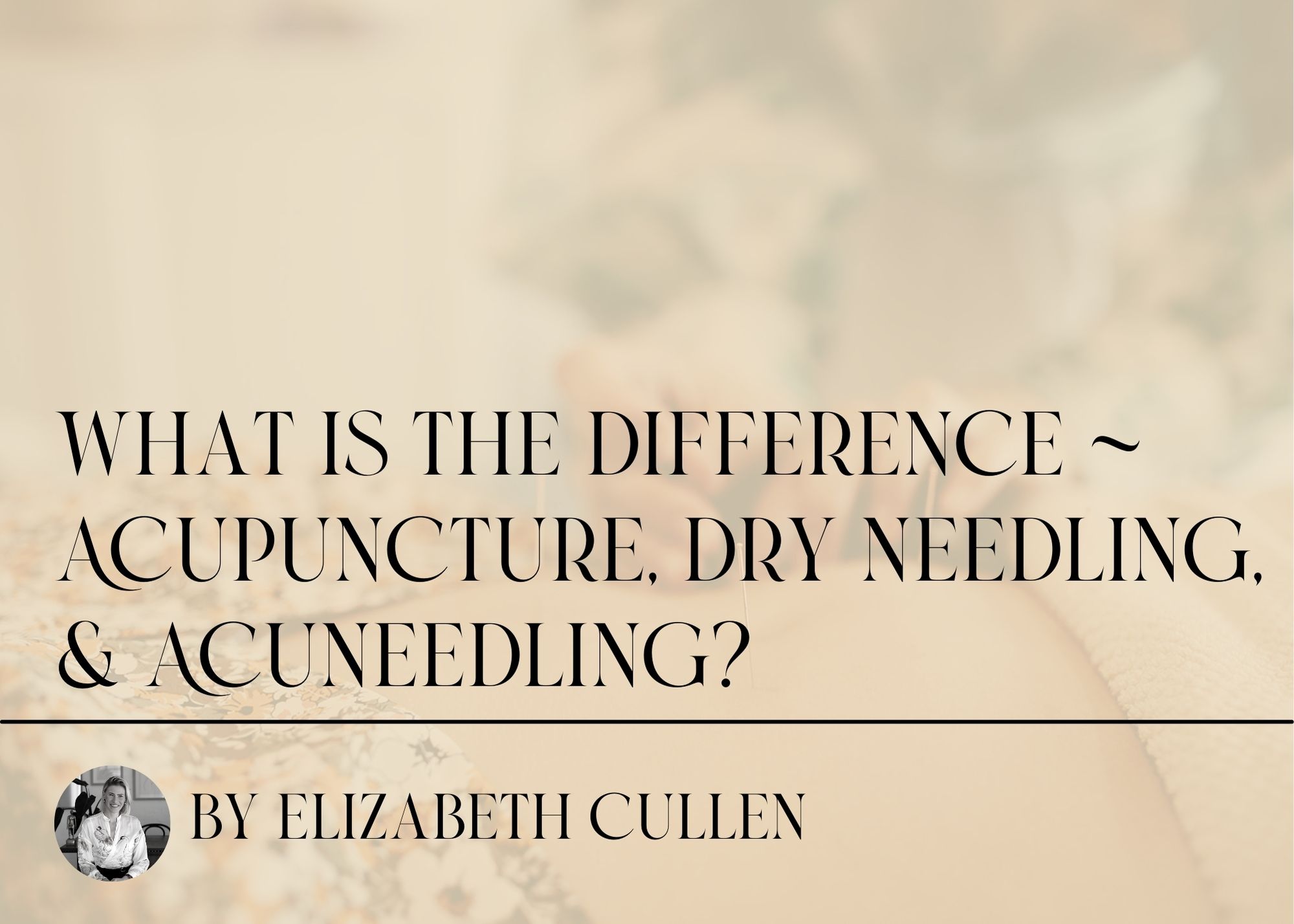The Dao Does.. What is the difference between Acupuncture, Dry Needling and Acuneedling?
Acupuncture, Dry needling and Acuneedling are all techniques which use thin needles to penetrate the skin for therapeutic purposes although there are significant differences in techniques and approaches to treatment. In this journal entry we will discuss who is able to perform each technique and how these practices are regulated in Australia.
Acupuncture
Acupuncture is a Traditional Chinese Medicine practice that has been practiced for thousands of years. Acupuncture was introduced to Australia as early as the 1880’s and today, is a primary form of complementary medicine used alone as well as in an integrative model with Western medicine ( Zheng 2014 ).
From a Traditional Chinese Medicine perspective, Acupuncture uses fine needles to stimulate specific points on the meridians, which are invisible channel pathways in the human body. Qi, a type of energy flows through the meridians and placement and manipulation of certain Acupuncture points promotes the smooth flow of Qi without obstruction. This enables the body to heal itself.
From a Biomedical perspective, Acupuncture uses fine needles to activate specific Acupuncture points on the body located on the meridians of the body. Through the insertion of needles, Acupuncture’s mechanism activates biochemical, sensory nerve and signalling pathways to achieve clinical effects for symptomatic relief.
Research into Acupuncture as a medical treatment has grown significantly over the last two decades with over 13,000 studies conducted around the world. A wide variety of clinical areas have been studied in both human and animal studies including pain and inflammation, oncology, mood and sleep disorders and pregnancy.
To access an overview of the Scientific evidence behind Acupuncture, click the link below to access Evidence Based Acupuncture which clearly provide up to date research:
For clinical benefit, at The Dao Health we recommend Acupuncture needles to be retained for a minimum of 25 minutes in treatment. At The Dao Health one use, sterile needles are used in treatment.
To practice Acupuncture in Australia, you are required to become a registered Acupuncturist. The minimum requirement for registration is a four year Bachelor Health Science degree in Traditional Chinese Medicine. All practitioners at The Dao Health completed their undergraduate degree in Traditional Chinese Medicine at The University of Technology, Sydney. To maintain registration, practitioners are required to fulfill CPD requirements of further learning each year.
Traditional Chinese Medicine practitioners and Acupuncturists became registered in 2012 with AHPRA ( Australian Health Practitioner Regulation Agency ) which is the supervising regulatory body.
Dry Needling
Dry Needling is a more recent technique that is based on Western medicine principles of anatomy and physiology which is aimed at targeting trigger points in the body to release tension and alleviate pain. The technique involves inserting thin needles into specific points in the body’s muscle and tissue to treat Musculoskeletal conditions. Needles are often retained for a shorter period of time than in an Acupuncture treatment and is often more painful.
There are no official guidelines with who is able to practice Dry Needling or a supervising regulatory body. Evidence behind the effectiveness of Dry Needling techniques is minimal and requires further research (Fernández-De-Las-Peñas 2021). Dry Needling is often practiced by Physiotherapists, Chiropractors and Massage therapists. Before receiving Dry Needling, it is important to check on the practitioner’s credentials and training.
At The Dao Health, we highly recommend our patients who are open to conceiving, currently undergoing Fertility treatment and our pregnant patients to avoid having Dry Needling due to the risk of specific points on the body being contraindicated in pregnancy. This is often not disclosed thoroughly in Dry Needling courses.
Acuneedling
Acuneedling is often claimed as being the same practice as Acupuncture for Pregnancy and Postpartum performed in private practice although there is currently no registered course in Australia and students are only required to complete a weekend course to practice Acuneedling which does not provide the depth of education given in a four year Bachelor Degree of Health Science in Traditional Chinese Medicine.
There are no official guidelines with who is able to practice Acuneedling or a supervising regulatory body.
At The Dao Health, we highly recommend that Pregnant and Postpartum patients only receive Acupuncture treatment from a registered Acupuncturist who is trained in Women’s Health and Pregnancy.
To summarise ~
In the current environment it can be difficult to differentiate Acupuncture treatment to Dry needling and Acuneedling due to mixed language used by health professionals.
Acupuncture treatment can only be performed by a registered Acupuncturist who has studied a minimum of four years at university and practices based on the principles of Traditional Chinese Medicine.
When looking for an Acupuncturist, I recommend using the Practitioner Directory on the Australian Acupuncture and Chinese Medicine association website:
https://www.acupuncture.org.au/find-a-practitioner
For Women’s Health, Fertility and Pregnancy, I recommend that you enquire with the Acupuncturist you are considering to see for treatment to ensure they are trained specifically in this area.
~
Written by Elizabeth Cullen
BHlthSc (TCM), MWomHMed
References:
Fernández-De-Las-Peñas C, Plaza-Manzano G, Sanchez-Infante J, Gómez-Chiguano GF, Cleland JA, Arias-Buría JL, López-de-Uralde-Villanueva I, Navarro-Santana MJ. Is Dry Needling Effective When Combined with Other Therapies for Myofascial Trigger Points Associated with Neck Pain Symptoms? A Systematic Review and Meta-Analysis. Pain Res Manag. 2021 Feb
Zheng Z. Acupuncture in Australia: regulation, education, practice, and research. Integr Med Res. 2014 Sep;3(3):103-110. doi: 10.1016/j.imr.2014.06.002. Epub 2014 Jul 3.

